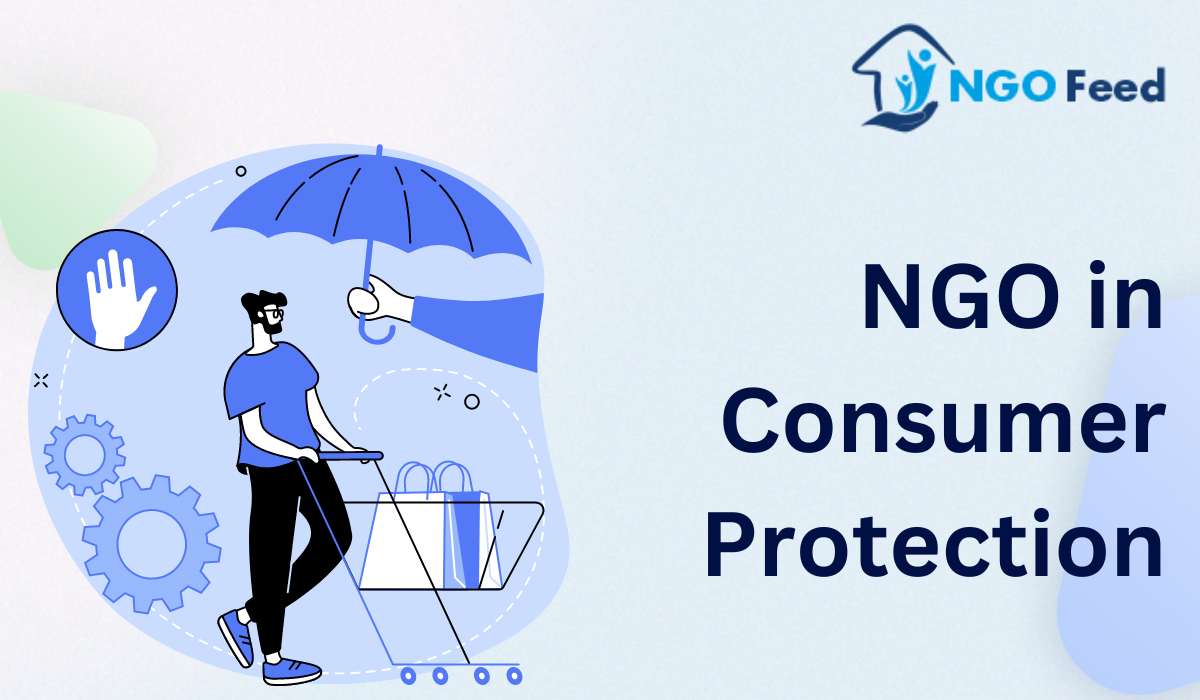NGO in Consumer Protection: In the world of today that evolves at a high pace and is connected strongly, consumer rights protection issue has become a crucial one. Hence, in a society that is flooded with diverse products and services, consumers have to contend with many things from misleading advertisements, extortionate prices to unsafe products and unethical business operations. This is where Non-Governmental Organizations (NGOs) have stepped in as the primary advocates and organizations that monitor the consumers’ rights and interests. The blog highlights the crucial role of NGOs in consumer protection, covering the core focuses, groundbreaking approaches and outcomes accomplished by the organizations to defend the rights of individuals and society as a whole.
Table of Contents
What is the Importance of NGO in Consumer Protection?
Consumer protection covers all the legal rights, acts, and rules that support the safety and restrictive of the consumers insurance. It is an integral element of a well- performing economy, as it ensures that the firms operate transparently, fairly and the customers justifiably trust them. Consumer protection which is delivered efficiently both assists the consumers themselves as well as the market in whole improving the economy and social sector of the state.
The Rise of NGOs in Consumer Protection
Over the past decades, NGOs have emerged as powerful advocates for consumer rights, filling the gaps left by government policies and corporate self-regulation. These independent, non-profit organizations have leveraged their expertise, grassroots connections, and advocacy skills to champion the cause of consumers, holding businesses and policymakers accountable and driving meaningful change.
Key Areas of NGO Involvement in Consumer Protection
In this section, you will find a wealth of information regarding the significant areas where NGOs in India play a crucial role in safeguarding the rights of consumers. From ensuring the quality of products and services to advocating for consumer rights policies, we have covered it all in detail to provide you with a comprehensive understanding of NGO involvement in consumer protection.
1. Identifying and Prohibiting Fake or Misleading Practices
NGOs contribute significantly to making (and monitoring) the market place, digging out the consumer rumors, and uncovering the unfair or the deceptive trade practices of the businesses. Acutely, the approach involves using researches, undercover inspections and the gathering of consumers’ testimonies to put together very detailed reports that are published and made public.
2. Advocacy and Policymaking
NGOs are at the head of the advocacy for policy work that mostly employ a mixture of strategies to create much attention to the public, rally consumer power and pressurize the legislators to pass consumer protection laws and regulations. Their lobbying, campaigns in public, as well as, partnerships with various stakeholders constitute their activities to bring forth change.
3. Providing Legal Assistance and Representation
Defend many NGOs doing legal aid and representation for individual consumers in situations when businesses which would have brought about mistakes, to navigate the complex legal system and obtain redress. This assistance is especially necessary because the majority of the vulnerable and deprived who may not be fully aware of the benefits of knowledge essential for seeking legal justice find it difficult to pursue it on their own.
4. Consumer Education and Empowerment
An NGO conducts a very essential task but providing people with knowledge and devices that allow them to be independent while shopping, to choose what they want and to stand for consumers` rights. NGOs achieve this objective by conducting workshops plus awareness campaigns during which they teach people about the effects of consumer behavior on our environment. They, in turn, provide educational materials aimed at transforming the audience into an involved and enlightened consumer group.
5. Fostering Collaborative Initiatives
Many NGOs deploy collaboration efforts that unite consumers, companies, and the policy makers stakeholders to work out durable solutions for foundational issues and develop novel solutions. Collaborative relationships among the players can form codes of conduct, that is, alternative dispute procedures, and other approaches to protect consumers.
Case Studies: Successes and Challenges of NGO Interventions
This section of our report delves into the intricacies of NGO interventions for consumer protection in India. Through detailed case studies, we will illustrate the various successes and challenges that NGOs face in their endeavors to ensure that consumers in India are protected. Our analysis will provide you with a comprehensive understanding of the ongoing efforts and outcomes of these interventions.
Case Study 1: Protecting Consumers from Predatory Lending Practices
In the United States, the NGO “Consumer Rights Coalition” has been at the forefront of the fight against predatory lending practices, such as payday loans and subprime mortgages that exploit vulnerable consumers. Through extensive advocacy, public awareness campaigns, and legal challenges, the organization has successfully pushed for stricter regulations and better enforcement, leading to tangible improvements in consumer protection. However, the organization has faced significant pushback from the powerful financial industry, which has sought to undermine its efforts.
Case Study 2: Safeguarding Food Safety and Labeling
In India, the NGO “Consumer Voice” has been a leading advocate for food safety and accurate product labeling. The organization has conducted extensive testing and research, exposing the presence of harmful additives, mislabeled ingredients, and other food safety issues. Through its advocacy efforts, the NGO has influenced policymakers to strengthen food safety regulations and improve consumer awareness. Despite these successes, the organization has encountered resistance from the food industry, which has sought to hinder its ability to conduct independent testing and share findings with the public.
Case Study 3: Protecting Vulnerable Consumers from Unfair Practices
In the United Kingdom, the NGO “Age Concern” has championed the rights of elderly consumers, who are often targets of predatory practices, such as aggressive marketing tactics and exploitative contracts. By providing legal aid, raising public awareness, and engaging with policymakers, the organization has been instrumental in securing key protections for older consumers. However, the organization has faced challenges in securing sustainable funding to maintain its vital interventions, particularly during times of economic uncertainty.
Innovative Approaches Adopted by NGOs
This section provides detailed information about the innovative approaches implemented by NGOs in India to protect consumers.
1. Integrating Technology and Data Analysis
NGOs are leveraging the power of technology and data analytics to enhance their consumer protection efforts. From developing online complaint portals to using artificial intelligence to identify patterns of unfair practices, NGOs are at the forefront of technological innovation in the field.
2. Collaborative Partnerships and Crowdsourcing
Paying tribute to the significance of joint efforts, NGOs are forming strategic alliances with other civil society agencies, academic institutes, and governmental bodies in order to grow in size and improve the efficiency shared by everyone. Furthermore, some NGOs are resorting to crowdsourcing programs to pool information in the long run.
3. Embracing a Holistic Approach to Consumer Protection
Many NGOs are adopting a comprehensive, intersectional approach to consumer protection, addressing the interconnected challenges of economic inequality, digital literacy, and the unique vulnerabilities faced by marginalized communities.
Challenges Faced by NGOs in Consumers Protection
1. Resistance from Powerful Corporate Interests
NGOs often face significant pushback and opposition from large corporations and industry groups that seek to protect their profits and maintain the status quo, even if it comes at the expense of consumer welfare.
2. Limited Resources and Funding Constraints
Securing sustainable funding remains a persistent challenge for NGOs, as they often rely on a patchwork of grants, donations, and limited government support to sustain their operations.
3. Navigating Complex Legal and Regulatory Environments
The legal and regulatory landscape surrounding consumer protection can be highly complex, with varying laws and standards across different jurisdictions. Navigating this environment and effectively engaging with policymakers can be a significant challenge for NGOs.
Future of NGOs in Consumer Protection
Adapting to a Rapidly Changing Marketplace
As the marketplace continues to evolve, with the rise of e-commerce, digital services, and emerging technologies, NGOs must adapt their strategies and develop new approaches to address emerging consumer challenges.
Fostering Inclusive and Collaborative Approaches
Moving forward, NGOs must prioritize inclusive, collaborative approaches that empower diverse consumer groups, including marginalized communities, to participate in the development and implementation of consumer protection initiatives.
Leveraging Digital Tools and Data-driven Insights
NGOs must continue to embrace and harness the power of digital tools, data analytics, and innovative technologies to enhance their monitoring, advocacy, and consumer empowerment efforts.
Conclusion
NGOs have proven to be unbroken proponents of consumer rights, utilizing their thoroughness, lobbying qualities, and grassroots orientation to keep businesses under judgment, exerting influence on policymaking and making consumers stronger as a result. Baillatse di stronger challenges, from lobbying by powerful business entities to limited resources, NGOs still carry a torch of consumer and community empowerment and wellness in the market space.
Consistently, with the worldwide consumers market transformation, the NGOs in consumer protection as an entity will be of significant value. With the capacity to change with the reality, to form strategic alliances and with prioritization of inclusive and data-driven governance, NGOs can indeed be the main force in combating for the fair, democratic, and safe consumer markets which are the keys to a sustainable economic and social progress.



